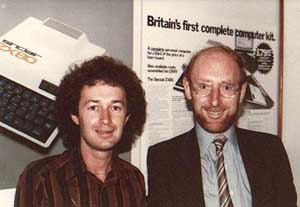Interface Publications
For many years I was involved one way or another with Interface Publications, the Australian version. I met Tim when we were working in our first jobs, straight out of school. We became good friends and later worked together in Australia as Interface Publications. This is how it happened.
The Story…
Tim Hartnell, an Australian journalist working in London, purchased a Sinclair ZX80 home computer in early 1980. After struggling to learn how to get the device to do anything (and discovering the best way to keep it cool and stable was to put a frozen carton of milk on top of it), Tim decided to share his experiences with the world. He started the Sinclair ZX80 User’s Club and published “Making the Most of Your Sinclair ZX80″. The enterprise was a runaway success. Within 6 weeks, the Users’ Club had 3000 members and the book was an instant best-seller.
“The Users’ Club was first advertised in a three-line entry in the back of PCW – and I remember thinking it might take a few months to take off and not to be too disappointed. That’s how little I knew.” Tim said.
Tim followed up with computer programs on cassette and more books about the ZX80 and subsequent Sinclair computers. Along with Liz North, Tim turned all of this into a successful business, Interface Publications.

In 1983 Tim approached an old friend back in Australia, Robert Young (that’s me, as mentioned above), and asked him to write a book for Interface Publications. This became “Dynamic Games for Your Dragon 32”. Robert wrote a further 13 books for Interface Publications, mostly for the VIC20 and Commodore 64 computers.
Tim returned to Australia in 1984 and, together with Robert, branched out into custom-written software and mail-order computer software. Tim and Robert also wrote articles for newspapers and magazines, educational texts and provided computer training courses.
Tragically, Tim, then 40 years old, died of cancer in 1991. Robert took over Interface Publications in Australia and continued providing computer-based writing and training.
Robert has provided training courses, manuals, instructional text and web copy for companies such as Mobil Australia, Shell Australia, Breeze Software (now Radiant Software Systems), Unisys Australia, Australia Post, Deakin University, IWL Ltd and the Medical Practitioners Board of Victoria.
Robert is now retired from the computer industry and concentrates on photography and his own writing.

The photo above was taken by Robert in April 1980. It shows Tim waiting outside Madame Tussaud’s in London. He is reading a book about BASIC programming, trying to work out how to make the ZX80 do something. When the photo was taken, he was reading a chapter about For/Next Loops, trying to work out what they did and how they were used. It was while he was reading this chapter that Tim realised that if he was having difficulty understanding this programming stuff, then other people probably were too. This photo virtually shows the instant that Interface Publications was born.
Hi Rob. Stumbled across this while telling a friend about Tim. I’m Liz Norths son. I must have met you at some point years ago. Mum’s well and says hi. We both still miss Tim very much
Hi,
I grew up with the ZX81 and the amazingly hi-tec (so it seemed at the time) machines that followed. I loved books like Tim’s that taught me to program without tedious instruction, but just by providing a bunch of code to type in and a vivid intro to suck me in – like a description of the horde of dwarven gold i’d be sure to find in the catacombs.
Now I’m teaching kids to code and have bought myself a pile of Tim’s old books as inspiration. I’ve just finished translating my first game into Python. Thanks Robert, and thanks Tim for the gold.
Cheers,
Martin
Great to hear from you Martin. I love hearing from the people who remember the old days and found value and fun in those books.